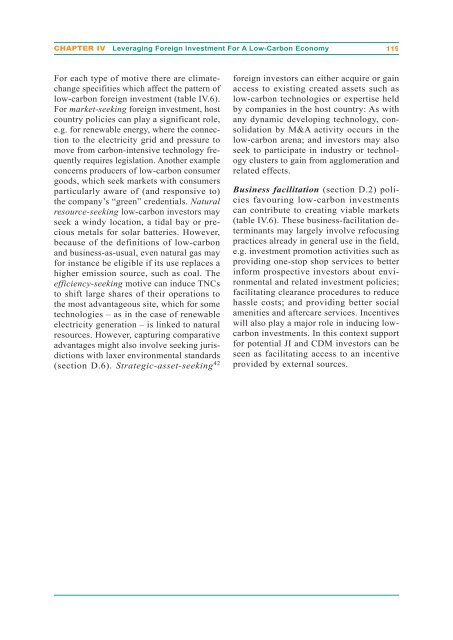UN World Investment Report 2010 - Office of Trade Negotiations
UN World Investment Report 2010 - Office of Trade Negotiations
UN World Investment Report 2010 - Office of Trade Negotiations
You also want an ePaper? Increase the reach of your titles
YUMPU automatically turns print PDFs into web optimized ePapers that Google loves.
CHAPTER IV Leveraging Foreign <strong>Investment</strong> For A Low-Carbon Economy 119<br />
For each type <strong>of</strong> motive there are climatechange<br />
specifities which affect the pattern <strong>of</strong><br />
low-carbon foreign investment (table IV.6).<br />
For market-seeking foreign investment, host<br />
country policies can play a significant role,<br />
e.g. for renewable energy, where the connection<br />
to the electricity grid and pressure to<br />
move from carbon-intensive technology frequently<br />
requires legislation. Another example<br />
concerns producers <strong>of</strong> low-carbon consumer<br />
goods, which seek markets with consumers<br />
particularly aware <strong>of</strong> (and responsive to)<br />
the company’s “green” credentials. Natural<br />
resource-seeking low-carbon investors may<br />
seek a windy location, a tidal bay or precious<br />
metals for solar batteries. However,<br />
because <strong>of</strong> the definitions <strong>of</strong> low-carbon<br />
and business-as-usual, even natural gas may<br />
for instance be eligible if its use replaces a<br />
higher emission source, such as coal. The<br />
efficiency-seeking motive can induce TNCs<br />
to shift large shares <strong>of</strong> their operations to<br />
the most advantageous site, which for some<br />
technologies – as in the case <strong>of</strong> renewable<br />
electricity generation – is linked to natural<br />
resources. However, capturing comparative<br />
advantages might also involve seeking jurisdictions<br />
with laxer environmental standards<br />
(section D.6). Strategic-asset-seeking 42<br />
foreign investors can either acquire or gain<br />
access to existing created assets such as<br />
low-carbon technologies or expertise held<br />
by companies in the host country: As with<br />
any dynamic developing technology, consolidation<br />
by M&A activity occurs in the<br />
low-carbon arena; and investors may also<br />
seek to participate in industry or technology<br />
clusters to gain from agglomeration and<br />
related effects.<br />
Business facilitation (section D.2) policies<br />
favouring low-carbon investments<br />
can contribute to creating viable markets<br />
(table IV.6). These business-facilitation determinants<br />
may largely involve refocusing<br />
practices already in general use in the field,<br />
e.g. investment promotion activities such as<br />
providing one-stop shop services to better<br />
inform prospective investors about environmental<br />
and related investment policies;<br />
facilitating clearance procedures to reduce<br />
hassle costs; and providing better social<br />
amenities and aftercare services. Incentives<br />
will also play a major role in inducing lowcarbon<br />
investments. In this context support<br />
for potential JI and CDM investors can be<br />
seen as facilitating access to an incentive<br />
provided by external sources.

















